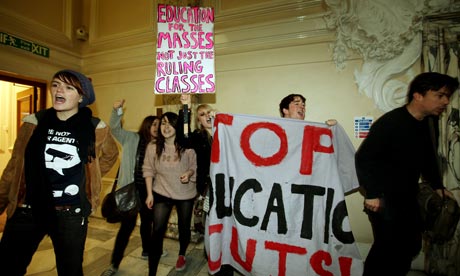The NUS leader's belated support for the university occupations reveals someone uneasy with radical direct action

It was in such a meeting that we heard news of NUS president Aaron Porter's statement of support for the anti-cuts occupations that are ongoing in many of the country's universities and look likely to grow. A ripple of polite applause crept across our lecture theatre but in general the mood was indifferent. Compared with the times we've received emails from prominent political activists, promises of "dinner for all" from our lecturers or words of congratulations from local people, it didn't seem to matter that much.
It is our occupation's atmosphere of radical, creative discussion and collective action that might explain why Porter's apology for "dithering" in recent weeks fell a little flat. On the second National Day of Action today, and after six nights, our occupation is stronger than ever. Maintaining easy access in and out of the building has meant our space has been available for local sixth form and college students as well, providing a supportive environment for lecturers to have meetings about the cuts. We have organised our own daily educational programme, open to the public, as well as helping to allow scheduled classes to continue in our occupied space. Calls from local and national press are now almost as frequent as donations of food and blankets.
Another reason we were unmoved by Porter's statement was perhaps because his "U-turn" is a reflection of what we have experienced locally with our student representatives. They too have made new promises to support anti-cuts campaigns but we have learned through six days of successful occupation that this support, though welcome, is not vital. Like our sabbatical officers, Aaron Porter should support students engaged in peaceful direct action to defend their education. It remains to be seen how his statements to this effect will impact on those in the student movement he labels "unrepresentative" because they venture beyond the NUS blueprint for fighting cuts.
The action of occupying a university is not merely to challenge university managements to come out against cuts, nor is it only to put pressure on the coalition to stop talking misleadingly about "togetherness" when it comes to education reforms. Occupations are not just a political tactic that the NUS supports or does not. To occupy a university space is to fundamentally question what education is for, how teaching and learning is organised, whose decisions are acted upon and how those decisions are made. We are challenging relationships taken for granted and stimulating ideas for different ways of organising society.
Aaron Porter should join this collective effort to re-imagine education. But this must mean he accepts what will sometimes be a muddled conversation about the way we organise and protest: we are learning a lot of this as we go along. We have not forgotten Porter's initial statements following the protests at Millbank. His condemning of "violence", without distinguishing between people and windows, felt like a lazy dismissal of radicalism full stop. The student movement needs a fighting union which can be relied upon to support and educate its members about taking all actions against cuts. Porter's recent statements reflect his response to the strength of the growing grassroots student movement. This is an encouraging reflection of our collective political potential to suggest alternatives for education and necessarily perhaps for student representation.
This movement is bigger than Aaron Porter. It is bigger than the universities and bigger than the project of an occupied lecture theatre. In the north-east, the impetus for actions so far has come primarily from school and college students. This energy is in turn spreading across the wider community. This fightback will continue with or without Aaron Porter's support. It is simply too serious now to dwell for any length of time on what could be more empty promises. We are busy organising, occupying and reimagining what we want education to be. In short, we have got more pressing things to do.
SOURCE

No comments:
Post a Comment